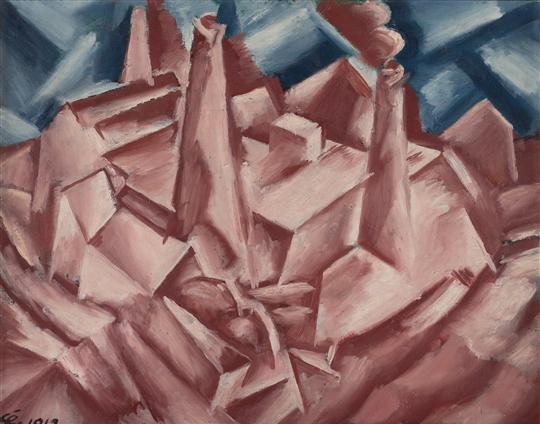Description
The painting "Továrna - 1912", created by the prominent Czech artist Josef? Avel, is an emblematic work that invites reflection on industrialization and its impact on the human environment and nature. This piece, like many of the works of? Avel, is part of the context of modernism, where the author combines elements of Cubism and an expressionist approach, thus achieving a composition that, although simple in its form, is loaded with a deep symbolism .
At first glance, the work presents a geometric structure that resembles a factory or an industrial complex. Rectangular and trapezoidal forms dominate the painting, suggesting the rigidity and order of the industrial world. ? Avel uses a palette of earthly colors, which evokes the robustness of construction materials and underlines the connection between man and the machine. The brown, gray and yellow palette not only resonates with the colors of steel and concrete, but also establishes a gloomy, almost melancholic environment, which seems to criticize the dehumanization that industrial progress brings.
The few visible characters in painting seem to be marginal figures in this vast landscape of machine and matter. They are represented abstractly, which makes them symbols of a humanity that is subsumed by technological progress. The inclusion of these human figures, although blurred and almost non -existent in detail, allows the viewer to meditate on their role in a world that changes rapidly, where human nature and relationships can be threatened by the growing mechanization.
An interesting aspect of "Továrna - 1912" is the way in which? Avel fuses his criticism of industrialization with his recognition of what he represents in the context of his time. As part of the Czech avant -garde movement, his work, although it is a comment about the present, also reflects an interest in the future and the possibility of integration between man and the machine. This dialogue is particularly relevant in the context of the early twentieth century, where tensions between innovation and tradition began to take shape.
The work of? Avel, including "Továrna", resonates with the themes of modern capitalism and the relationship of the individual with the machine, a preamble of the discussions that would bloom in the second half of the twentieth century on alienation at work and fight For identity in an industrial world. Similar compositions of the time, such as those of Italian futurists or Russian constructivists, also explore this dichotomy between human being and technology, but the approach of? A? A? A? A? A? A? A? A? A? progress.
Thus, "Továrna - 1912" is not just a visual representation of a factory; It is a reflection of the tensions that industrialization has created in society and in the human psyche. Through its master use of color, shape and composition,? Avel offers us a window in its time, highlighting the struggles and the uncertain future of a generation that faces the imposing advance of modernity. In summary, this work is based as a milestone not only in the career of? Avel, but also in the history of Czech art and European modernism, a testimony of its unique ability to capture the essence of the human spirit in an industrial environment.
KUADROS ©, a famous paint on your wall.
Hand-made oil painting reproductions, with the quality of professional artists and the distinctive seal of KUADROS ©.
Art reproduction service with satisfaction guarantee. If you are not completely satisfied with the replica of your painting, we refund your money 100%.

